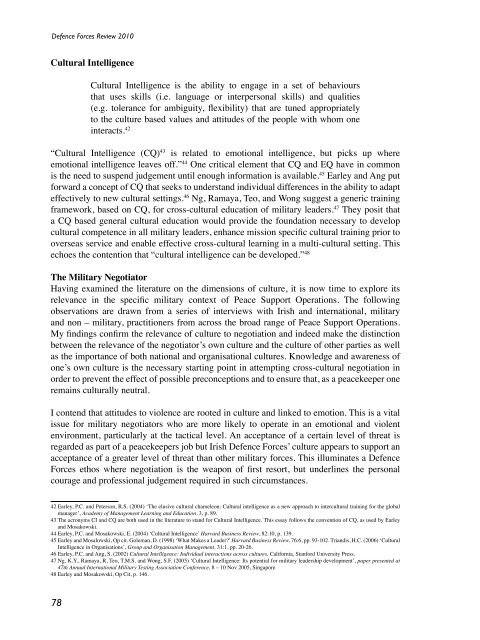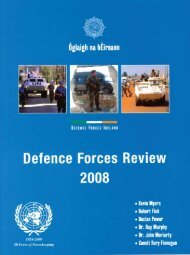Defence Forces Review 2010
Defence Forces Review 2010
Defence Forces Review 2010
You also want an ePaper? Increase the reach of your titles
YUMPU automatically turns print PDFs into web optimized ePapers that Google loves.
<strong>Defence</strong> <strong>Forces</strong> <strong>Review</strong> <strong>2010</strong>Cultural IntelligenceCultural Intelligence is the ability to engage in a set of behavioursthat uses skills (i.e. language or interpersonal skills) and qualities(e.g. tolerance for ambiguity, flexibility) that are tuned appropriatelyto the culture based values and attitudes of the people with whom oneinteracts. 42“Cultural Intelligence (CQ) 43 is related to emotional intelligence, but picks up whereemotional intelligence leaves off.” 44 One critical element that CQ and EQ have in commonis the need to suspend judgement until enough information is available. 45 Earley and Ang putforward a concept of CQ that seeks to understand individual differences in the ability to adapteffectively to new cultural settings. 46 Ng, Ramaya, Teo, and Wong suggest a generic trainingframework, based on CQ, for cross-cultural education of military leaders. 47 They posit thata CQ based general cultural education would provide the foundation necessary to developcultural competence in all military leaders, enhance mission specific cultural training prior tooverseas service and enable effective cross-cultural learning in a multi-cultural setting. Thisechoes the contention that “cultural intelligence can be developed.” 48The Military NegotiatorHaving examined the literature on the dimensions of culture, it is now time to explore itsrelevance in the specific military context of Peace Support Operations. The followingobservations are drawn from a series of interviews with Irish and international, militaryand non – military, practitioners from across the broad range of Peace Support Operations.My findings confirm the relevance of culture to negotiation and indeed make the distinctionbetween the relevance of the negotiator’s own culture and the culture of other parties as wellas the importance of both national and organisational cultures. Knowledge and awareness ofone’s own culture is the necessary starting point in attempting cross-cultural negotiation inorder to prevent the effect of possible preconceptions and to ensure that, as a peacekeeper oneremains culturally neutral.I contend that attitudes to violence are rooted in culture and linked to emotion. This is a vitalissue for military negotiators who are more likely to operate in an emotional and violentenvironment, particularly at the tactical level. An acceptance of a certain level of threat isregarded as part of a peacekeepers job but Irish <strong>Defence</strong> <strong>Forces</strong>’ culture appears to support anacceptance of a greater level of threat than other military forces. This illuminates a <strong>Defence</strong><strong>Forces</strong> ethos where negotiation is the weapon of first resort, but underlines the personalcourage and professional judgement required in such circumstances.42 Earley, P.C. and Peterson, R.S. (2004) ‘The elusive cultural chameleon: Cultural intelligence as a new approach to intercultural training for the globalmanager’, Academy of Management Learning and Education, 3, p. 89.43 The acronyms CI and CQ are both used in the literature to stand for Cultural Intelligence. This essay follows the convention of CQ, as used by Earleyand Mosakowski.44 Earley, P.C. and Mosakowski, E. (2004) ‘Cultural Intelligence’ Harvard Business <strong>Review</strong>, 82:10, p. 139.45 Earley and Mosalowski, Op cit. Goleman, D. (1998) ‘What Makes a Leader?’ Harvard Business <strong>Review</strong>, 76:6, pp. 93-102. Triandis, H.C. (2006) ‘CulturalIntelligence in Organisations’, Group and Organisation Management, 31:1, pp. 20-26.46 Earley, P.C. and Ang, S. (2002) Cultural Intelligence: Individual interactions across cultures, California, Stanford University Press.47 Ng, K.Y., Ramaya, R, Teo, T.M.S. and Wong, S.F. (2005) ‘Cultural Intelligence: Its potential for military leadership development’, paper presented at47th Annual International Military Testing Association Conference, 8 – 10 Nov 2005, Singapore48 Earley and Mosakowski, Op Cit, p. 146.78
















